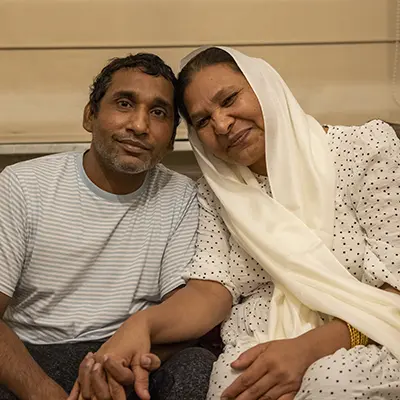- The Italian Supreme Court ruled against Christian community Breccia di Roma after lower courts affirmed that Evangelical places of worship “can look different” than other denominations.
- Represented by ADF International, the church filed an appeal against the discriminatory practice — government has no right to discriminate against churches based on perceived appearance.

Strasbourg/Rome (8 October 2024) – Evangelical church Breccia di Roma, which uses a former shop as its place for worship, has appealed to the European Court of Human Rights to defend its freedom to worship in the place of its choosing. The church community, represented before the Court by ADF International, obtained authorization to change the building’s intended commercial use – in part, so that the applicable taxation would align with the religious, i.e. non-commercial, nature of their activities.
“Why should the Tax Agency decide what a place of worship should look like? Our church is not worse or less spiritual, just because our architecture is different"
- Leonardo De Chirico, president of the church association
The Italian Tax Agency claimed that the interior architecture of Breccia di Roma’s worship space was not sufficiently religious in appearance. Therefore, it required the church to pay commercial taxes. Despite winning in the lower court, the Italian Supreme Court of Cassation sided with the authorities. With no further avenues for justice in Italy, the church’s case has been filed at the European Court of Human Rights.
“Why should the Tax Agency decide what a place of worship should look like? Our small space in the midst of Rome is the place of worship for our community. Every Sunday, we gather for service, our Bible studies are hosted there, and small communities meet in the building. Our worship doesn’t require specific architecture. But we are supposed to pay 50,000€ of allegedly accrued taxes only because we are Protestants. With the representation of ADF International, we are challenging this unjust discrimination at the European Court of Human Rights,” said Leonardo De Chirico, president of the church association.
ECtHR application: Italy violates international law and duty of neutrality
In its complaint before the Court, ADF International points to Article 9 of the European Convention of Human Rights, which protects the right to open and maintain places of worship. The classification as a “shop” and the imposition of the tax interferes with the exercise of these rights, creating a serious obstacle to the manifestation of the applicant’s religion.
“The right of the church to meet peacefully for worship in the manner prescribed by its Evangelical faith tradition is clearly protected by Article 9. While the church has no obligation to justify its appearance to the government, it has explained that the modesty of its architecture is rooted in its religion. Italian authorities have no right to assess the legitimacy of the ways this church’s religious beliefs are manifested in its physical appearance when clearly this is an authentic place of worship.
“Breccia di Roma was exposed to unjust discrimination also contrary to Article 14 of the European Convention,because it did not look like a ‘conventional’ place of worship in the view of the authorities. The tax exemption granted to all other religious buildings in Italy was denied to this church on a purely discriminatory basis. The Italian authorities are in violation of their duty of neutrality towards this religious group,” stated Dr. Lidia Rieder, Legal Officer for ADF International, which is representing the church before the European Court of Human Rights.
Background: What makes a church a church?
The association bought and restructured the building in 2015. It was previously used as a shop. Upon application, the Ministry of Cultural Heritage, Activities, and Tourism authorized the classification as a church “without any internal or external building work.” Thus, like all places of worship in Italy, the building would receive a tax exemption.
After the Italian Tax Agency inspected the property, the reclassification was denied, and initially, more than 11,000€ in allegedly accrued taxes were demanded. The church filed a lawsuit against the Tax Agency and the lower court sided with them. Photos showed that the building could in no way be connected to commercial activity.
“Everyone should be free to live out one’s faith in ways prescribed by it. Failing to have a basic understanding of different faith traditions is detrimental to a country’s guaranteed right to freedom of religion. State agencies cannot evaluate the religiosity of a church based on its appearance and architecture. We stand with Breccia di Roma so that religious freedom can flourish, and churches need not fear discrimination in free societies,” stated Rieder.
Second instance: Comparing one church to another
The Tax Agency appealed the judgment to the second-instance court, presenting photographs of the Basilica of San Silvestro, the (Great) Synagogue of Rome, and the Great Mosque of Rome. They argued that Breccia di Roma does not look like a “conventional” place of worship.
In response, the Evangelical community asserted that Evangelical and Protestant places of worship tend to be bare and devoid of ornaments. The court received photographic examples of other Evangelical churches, which were architecturally comparable to the property at issue.
“We don’t make money —we bring people together closer to Christ. Granted, our building does not match the Great Synagogue, a mosque, or any of the basilicas in Rome. Also, because our resources are limited, we meet in a comparatively unspectacular building. But why would a state punish us for that? Our church is not worse or less spiritual, just because our architecture is different,” De Chirico asserted further.
The second-instance Tax Court of Lazio ruled the Tax Agency’s appeal unfounded. According to the court, the authorities had not only failed to consider the property’s owner, a religious organization, but also the Ministry’s authorization to use the building for public worship and the absence of furnishings needed to carry out commercial activity. For a proper assessment, these considerations were indispensable, the court said.
“Religious freedom is an essential good for everyone”
Again, the agency appealed. The Supreme Court of Cassation accepted the case and ruled against the church in May 2024. The decision referred to the absence of “structural interventions consistent with the characteristics related to the exercise of religious activities,” failing to define what those structural changes would have to be for an Evangelical place of worship.
Thus, the Supreme Court quashed the judgments of the two lower courts. Now the applicant is being ordered to pay the tax attributed to the church by the Tax Agency as if it were “commercial” property. By now the tax amounts to 41,580€. However, including penalties and legal costs, the church would have to pay approximately 50,000€.
“Paying 50.000€ in taxes and penalties is a great burden for a self-supported community of believers. Our hope is that the European Court of Human Rights will uphold our freedom of religion and equal treatment under the law. Urban space is not reserved for century-old institutions or wealthy communities. If we win our case in court, many other Evangelical churches, in addition to the country as a whole, would benefit — religious freedom is an essential good for everyone. What if the Tax Agency decides tomorrow that due to the splendor of a traditional church, the property tax has to be even higher?” added De Chirico.













